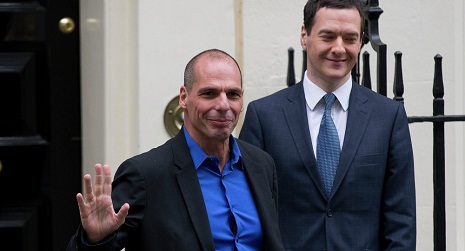
The Chancellor told Sky News: "What you see now in this stand-off between the eurozone and Greece is the risk of a full blown crisis which would do real damage to the European economy — and is a risk to Britain.
"We need the eurozone to find a common solution and here at home we need to go on working through our economic plan which has kept us safe."
The fear that Greece may in fact leave the European Union has increased in recent days, following Germany`s rejection of Greek proposals for an increase in funding.
Athens has put forward a plan, calling for more loans for the next six months, but with a reduction in existing austerity measures.
Despite Greece making concessions not to increase public spending without EU permission, a statement from the German Finance Ministry said that the Greek plea was "not a substantial proposal for a solution."
This comes after the Greek government rejected an extension of its current €240 billion (£178 billion) bailout deal.
Tensions Rising
Hopes earlier in the week that all parties were coming close to an agreement have been seemingly dashed, following reports of an increase in tensions between the German and Greek camps.
There have been reports of a significant clash of personalities between German Finance Minister Wolfgang Schauble and Greek counterpart Yanis Varoufakis, as well as the ideological differences between the German and Greek governments when it comes to tackling debt.
Experts remain divided on the outcomes of the negotiations, but warn that if a deal cannot be met, Greece may run out of money by the beginning of March, with the EU`s bailout programme set to finish on February 28.
If a deal on continued loans cannot be met, Greece may be forced to default on its debts and leave the eurozone, potentially sparking serious economic problems in Europe.
However, there is some optimism among those involved in talks that a deal will be agreed upon, with Germany`s EU Commissioner Guenther Oettinger confident the two parties will come to some sort of agreement. Oettinger told German radio Deutschlandfunk:
"We are working so that Greece stays in the eurozone. On this basis I think an agreement will still be possible in the next eight days — if necessary via a further meeting of government leaders."
Meanwhile, Greek Prime Minister Alexis Tsipras, whose SYRIZA party pledged to put an end to austerity measures, was quoted on Friday saying he was "certain" Greece`s request for a loan extension will be accepted.
Negotiations between European finance ministers will continue in Brussels on Friday afternoon.
More about:
















































